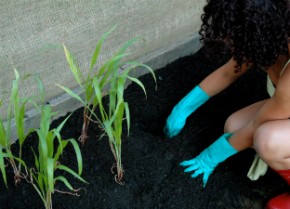New soil, new planters
On a bright blue afternoon, Anna Woofenden and I walked along the sidewalks that skirt the cozy houses in the Bay Area of California, and Anna started to articulate her call. “I’m not going to be a church planter,” she said.
My head snapped up as Anna continued to concentrate on the cement. I was stunned. As long as I had known her, Anna had dreamed of starting a worshiping community.
“I am a church planter,” she declared. My mouth cracked wide with a relieved smile.
The timing of Anna’s declaration was important, because Anna was also working on her last year of requirements at Earlham School of Religion. She didn’t wait to emerge from the classroom in Indiana to tend the soil for a new church in California. It’s not as if Anna rented a storefront and preached to a row of empty folding chairs; in fact, a lot of our conversation that afternoon hinged on where the church would be located. But she had been planting, nonetheless, in a steady, organic process—“organic” in the sense that she labored hard and prepared well in order to watch something beautiful slowly grow.
The project has been organic in another way: Anna is starting an urban garden church, and she envisions a gathering that will work in community beds, worship with one another, and feed each other as they have need.
Anna began by finding internships and networks of people who were working with, thinking about, and worshiping with food. As an intern at Bread for the World, she learned about food justice. While she served St. Gregory of Nyssa (the community that Sara Miles writes about in Take This Bread), she thought about the interplay between the liturgy on Sunday morning and what happens during the church’s feeding program.
Read our latest issue or browse back issues.
Then Anna looked for people who would pray for and support a new ministry. Anna networked with UNCO, an organization that nurtures new ministries and creative church leaders. She gathered a prayer group—people who pray for her and the community. She wrote a ministry plan, articulating the vision of the garden church as clearly as possible to her denomination. And she assembled a board to explore different income streams—individual donors, denominational grants, and local grants. A few weeks ago, before Anna graduated, all of these things were in place.
We need more people like Anna, people willing and able to start new communities straight out of seminary. Many denominations, worried about being good stewards of their resources, have been nervous about church planters who don’t have experience in traditional churches. We quickly recall the new communities that never took root. In fact, we often know the exact total of dollars spent trying to plant the new community. Afraid that we will sow on barren ground, we often wait until the soil, weather, and seeds are perfect before we start planting. Even when denominational bodies glean assets from congregations that have closed and set aside funds for starting new communities, they sit on the money, waiting for those optimal conditions.
In spite of these important cautions, in this transitional season, when many churches are coming to the end of their lifespan, others need to take root. Right now, an increasing number of congregations are closing or can no longer employ a full-time minister or have cut associate positions. The thinning opportunities make it particularly difficult for graduates entering the ministry, because when churches call pastors, they often give preference to those who have experience.
The largest generation our country has ever seen is entering adulthood. We have heard much about how millennials (born between 1982 and 2004) are leaving churches, but since the youngest of them are only ten years old, it seems rather odd to predict what an entire generation’s church attendance habits will be. Instead, we should be planting new congregations with a goal to nurture their spiritual lives.
The harvest is plentiful. And as we have more seminary students than we can employ, our laborers are plentiful too. In this transitional time of harvesting and planting, our denominations will need to welcome the vision of seminary graduates who want to plant new churches, support them in their work, and watch something beautiful grow.







